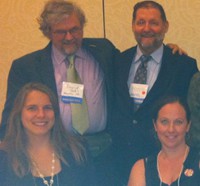A volunteer agency at Harvard featured my story. Here are a few reflections about Harvard grad psychiatric survivors (see photo of four of us). Can reach more members of the Harvard community?
 A Harvard University agency that places students in volunteer positions – Phillips Brooks House Association (PBHA) – has featured my brief ‘origin story’ on their web site.
A Harvard University agency that places students in volunteer positions – Phillips Brooks House Association (PBHA) – has featured my brief ‘origin story’ on their web site.
I thank PBHA for placing me as an intern in my senior year in one of the early psychiatric survivor activist groups, Mental Patients Liberation Front.
You can view my story about 1976 directly here.
Or at the moment view it via PBHA’s home page here.
Quick, Mention the Working Class!
Whenever I talk about having graduated from Harvard, such as in my little ‘biographies,’ I almost always mention something like this:
- Both of my grandfathers were coal miners for a combined 31 years.
- All my grandparents were lower-income immigrants (from Lithuania).
- I grew up in a working class family and neighborhood on the south side of Chicago.
- My scholarships to Harvard included one from the Teamsters Union.
I think I mention this class stuff because I feel there can be a strange prejudice when one mentions Harvard.
Graduating from Harvard is a little like getting one of those nifty awards from Dorothy at the end of Wizard of Oz: A widely-respected symbol that may help self-esteem, but the boost works best when affirming something real which everyone – absolutely everyone – already had all along.
When I mention I went to Harvard, I’m afraid someone will think I’m a “one percenter,” as the USA Occupy movement puts it. Well, I support the positive work of Occupy. I’m not a percenter. But if I were? Martin Luther King said he was creating a ‘beloved community,’ including reconciling with everyone, one percenters included.
Our movement of Marginalized and Disempowered (MAD) needs all the help we can get. Can we do more to reach the Harvard community?
Healing with Other Harvard Psych. Survivors
This Fall I was pleased to interact with a few other Harvard psychiatric survivor grads. Above is a photo of four of us (Laura Delano and Denise Maratos on bottom; myself and Jim Gottstein on top; click here for more detail).
At the October 2011 conference in Los Angeles of the International Society for Ethical Psychology and Psychiatry (ISEPP), I coordinated a panel of psychiatric survivors. At the end I invited about a dozen other psychiatric survivors onto the stage to briefly recap their own stories.
For a group photo I arranged it so that four of us who were psychiatric survivor Harvard grads were together. I found chatting even briefly with these friends deeply healing, thank you. This re-inspired me to reach back to Harvard folks.
Building Community for Mental Health Change at Harvard
In the last couple of years I’d tried a few other ways to reach out to the Harvard community for a variety of reasons:
- Harvard’s Mental Health Awareness and Advocacy Group (MHAAG), which is now defunct, invited me to speak on campus in 2009. MHAAG leaders liked my presentation, but I noticed that the full room in Lowell House was almost all non-Harvard community members, with few students and only one professor.
- Last year I discovered that on 17 February 2001 a Harvard student using the pseudonym Student X made quite a splash when the Harvard Crimson published a letter about having used the mental health system. (February 2001, by the way, was the 200th anniversary of Harvard’s McLean Hospital, where I experienced forced psychiatric drug injections.)
- One week later, on 24 February 2011, a Harvard Crimson editorial drew attention to that letter.
- On 7 April 2011, the Harvard Crimson published my own letter to the editor about this exchange.
- This led me discover HarvardSmiles which is a fairly recent initiative to support mental and emotional well being of Harvard community members. This is not necessarily a blanket endorsement because I have not reviewed their efforts or spoken with organizers, but from what I can see it appears to be a step in the right direction.
- In summer of 2011, I finally read a riveting book about Harvard and the mind, called Harvard and the Unabomber (2003) by Alton Chase. Building on an Atlantic article from 2000 on the subject, the author explores the troubling fact that Ted Kaczynski experienced an extremely traumatic, prolonged and demeaning psychological experiment as a Harvard undergrad which, while in no way excusing mass murder, may be important to understanding Kaczinski’s deadly alienation.
How Else Can We Reach the Harvard Community?
If you know a Harvard grad or community member, please encourage him or her to consider some of the below actions to help connect up the Harvard community with efforts to occupy our mental and emotional well being.
- If you have a relevant brief story, say about having used the mental health system while at Harvard, you can submit that as a blog entry via HarvardSmiles here. Even if it’s not published, you will have reached the project organizers.
- Harvard alumni/ae may considering visiting HU Alumni Affairs web site, completing the online registration for free, and joining appropriate Discussion Groups. While there is one oriented toward psychiatric professionals that I am on, if there is interest we could start one on mental health issues.
- If you are a Harvard alumnus or alumna, you may want to connect for free via the Harvard University Alumni member group on Linkedin, where you can post a news entry.
Document Actions

